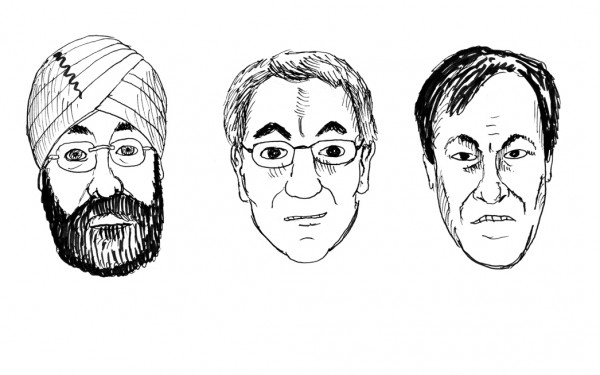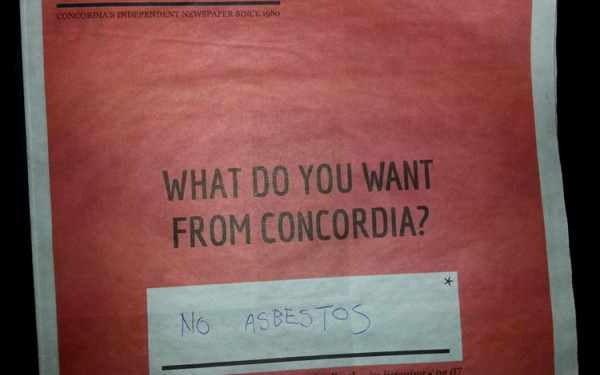Human Rights Advocates Want Concordia to Take Clear Stance on Asbestos Report
Anti-asbestos advocates are frustrated by the lack of response from Concordia to their demands for an independent review of a report briefly published on the university’s website.
The report, which discusses how to change public opinion about Quebec’s asbestos industry, has resulted in backlash from multiple sources.
Titled “Lessons from the Quebec Asbestos Industry: Can there be meaningful dialogue and consensus when facts come up against feelings?”, it was written by John Aylen, a lecturer at the John Molson School of Business and public relations professional with ties to the asbestos industry.
Aylen writes the groups in favour of asbestos—a mineral known to cause cancer—ran a campaign based on facts, while claiming opponents to the industry, mainly scientists and humans rights activists were using emotion to support their position.
The report was published by the Luc Beauregard Centre of Excellence in Communications within JMSB. Aylen acknowledges the “generous contributions” of Barry Smith, which he states is not his real name and is a pseudonym for Baljit Chadha.
Aylen doesn’t name Chadha in the report—it’s unclear why he uses a pseudonym—but describes him as the “leader of the consortium to purchase the [Jeffrey] mine.” Aylen refused to comment on the report.
Baljit Chadha is one of the most public supporters of reviving the asbestos industry in Quebec.
He is the founder of Balcorp, based in Montreal, New Delhi and Mumbai—India is one of the countries that still import asbestos.
Chadha was the head of a consortium of anonymous investors hoping to reopen Jeffrey mine in Quebec, which closed in 2011.
Aylen has acted as Chadha’s spokesperson in the past, and manages a communication firm that lists Chadha’s company, Balcorp, as a client. That information is not disclosed in the report. Aylen also thanks Guy Versailles in the article, a fellow PR consultant and paid spokesperson for Chadha.
On July 24, 14 human rights advisors, and medical and health specialists sent a letter to Concordia, saying the report was filled with inaccuracies about the health risks of asbestos and that it failed to mention conflicts of interests.
Concordia removed the report from its website soon after and the university said it’s looking into conflicts of interest, confidentially and internally.
Aylen’s largest conflict is the involvement of Chadha, an important donor to Concordia’s business school.
Another letter was sent to Concordia’s President Alan Shepard and the university’s Board of Governors in early August, calling for more information about the review process, but hasn’t received a reply, according to
Kathleen Ruff, a senior human rights advisor at the Rideau Institute in Ottawa.
“The response is troubling because [Shepard] has not answered our very clear request that there be an independent transparent investigation,” said Ruff.
“The public response of Concordia has been misleading and inaccurate and contradictory,” Ruff said.
Shepard said the Dean of JMSB was carrying out the review internally.
“We’re not intending to have an independent review,” he said. “I don’t think the circumstances warrant it.”
The report’s disclaimer says the Luc Beauregard Centre does not endorse or share the opinions in the study, which Ruff calls wrong, since the report appears to be funded by the centre and was published under Concordia’s letterhead on its website.
“This is not just about asbestos, this is about a failure of Concordia to respect or require basic academic and ethical standards,” Ruff said. “You cannot investigate yourself and expect it to be objective and have integrity.”
Aylen’s report was published in June and presented at the Canadian Public Relations Conference in Montreal, along with another report commissioned by the Luc Beauregard Centre on shale gas development in Quebec.
The centre’s director, Jordan LeBel, called the reports “a great example of what the Centre is all about,” in a press release now removed from Concordia’s website.
“They were commissioned after the Centre was approached by an expert in the energy field who had grown tired of dead-end debates in our society that basically paralyze or stop discussion on major issues,” LeBel said in the release.
When the Parti Québécois won in the 2012 elections, they followed through on a campaign promise to cancel a $58 million loan, which would have helped the Jeffery Mine in the town of Asbestos remain open.
Quebec was reportedly producing 150,000 tons of asbestos in 2010 and exporting 90 per cent of it to developing countries.
Asbestos is still being used in developing countries like India, where workers are directly exposed to materials containing asbestos.
“This report is incredibly irresponsible, and will contribute to harming the lives of people overseas,” Ruff said.
The World Health Organization describes all types of asbestos as a carcinogen. By inhaling fibers during construction, in factories handling asbestos or breathing air in housing with “crumbly” asbestos, people who are exposed to asbestos are at risk of lung, larynx, or ovary cancer as well as mesothelioma.
On its website, WHO states “the most efficient way to eliminate asbestos-related diseases is to stop the use of all types of asbestos.”
WHO has also chastised Chadha for claiming that the organization had established a level of exposure that is not a health risk, telling the Globe and Mail, “There is no safe threshold of exposure to all forms of asbestos.”
In 2012, Chadha’s wife, asbestos exporter Roshi Chadha, resigned from the governing bodies of McGill, St. Mary’s Hospital Foundation and the Canadian Red Cross after being pressured by anti-asbestos advocates.
Baljit Chadha was on Concordia’s Board of Governors until his term ended in 2012.
Aylen does not appear to be teaching any classes in the Fall 2015 and Winter 2016 semesters, according to the class list.

4_900_600_90.jpg)
_600_832_s.png)

4_600_375_90_s_c1.jpg)


.ed1.WEB_600_375_90_s_c1.jpg)